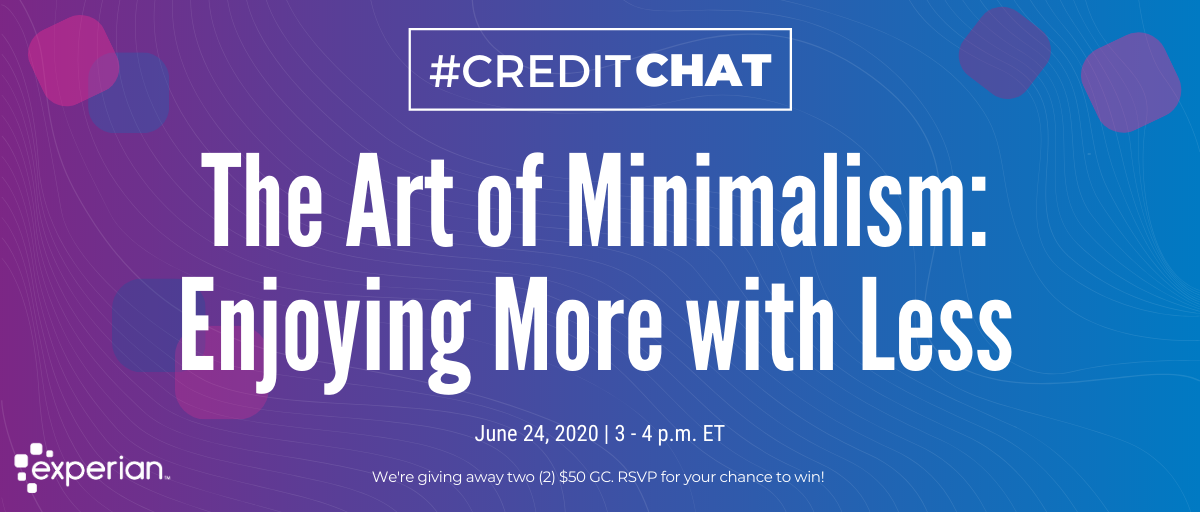The Art of Minimalism: Enjoying More with Less

Join our #CreditChat on Twitter every Wednesday at 3 p.m. ET.
The panel included Rod Griffin: Senior Director, Consumer Education and Advocacy, Experian; Forbes Advisor; Paulina Likos: Investing Reporter at U.S. New; Beverly Harzog: Credit Card Expert and Consumer Finance Analyst for U.S. News; Molly Ford-Coates: Founder, Ford Financial Management; Alexandria White: Credit Cards Reporter at CNBC Select; Todd Christensen: Education Manager at Money Fit by DRS; and Alicia R. Hudnett Reiss: CERTIFIED FINANCIAL PLANNER™.
Questions We Discussed:
Q1: What is minimalist living?
Q2: How can practicing minimalism improve your financial health?
Q3: What are some simple minimalist budgeting tips?
Q4: What are some ways to simplify and declutter your finance?
Q5: What are some questions to ask yourself when decluttering?
Q6: Where can you donate or sell your unwanted items?
Q7: What are some ways to save money on monthly expenses?
Q8: What is the difference between frugality and minimalism? How do you balance the two?
Q9: How can you use mindfulness to manage your money better?
Q10: Any last-minute tips on enjoying more with less?
Retweet these insights from our community:
A1: Minimalist living allows you to have a simpler, more meaningful, lifestyle. It usually involves decluttering, organizing and making better use of the space in your home or office. #creditchat
— Beverly Harzog (@BeverlyHarzog) June 24, 2020
A2: Buying less “stuff” is always good for your finances. Minimalism is in part about ensuring what you buy has purpose. #creditchat
— Rod Griffin (@Rod_Griffin) June 24, 2020
A3: Try adding items you want to buy online to your shopping cart and let them sit there for a few days. More likely than not, you’ll forget about it if it’s not an essential purchase. #CreditChat https://t.co/v2bCn8ol9Y
— Alexandria White (@awhite_credit) June 24, 2020
A4: Manage your expenses. Make a list of what you pay for every month and eliminate services/products you don’t need. This may even help with erasing debt. #CreditChat
— Paulina Likos (@Paulina_Likos) June 24, 2020
A5: Each financial decision, from spending to saving and investing must support what’s most important to your family and what brings the most joy to your life. Document your goals, refer to them often, and track progress toward them. #CreditChat https://t.co/Ki6j5rVbBL https://t.co/vsDQmzSHCj
— Forbes Advisor (@ForbesAdvisor) June 24, 2020
A6: Yard sales or consignment shops are good if you want some extra money. Or, you can donate to Goodwill and feed a family by helping to create or maintain someone’s job. #CreditChat
— Roslyn Lash, AFC® (@CoachRosLash) June 24, 2020
A7: We live in a world of subscription services but we probably don’t need them all. Detach wants from needs and consider cutting back. #CreditChat
— Paulina Likos (@Paulina_Likos) June 24, 2020
Q8: What is the difference between #frugality and #minimalism? How do you balance the two? #CreditChat pic.twitter.com/zCYEeOJjm0
— Experian #StaySafe (@Experian) June 24, 2020
A9: When using Mindfulness, become fully aware of your “why”. What are your motives for spending, saving, donating, and investing? This will clarify your goals and demonstrate your money is managed. #CreditChat
— Roslyn Lash, AFC® (@CoachRosLash) June 24, 2020
A10: Remember that life isn’t about what you have. It’s about the memories you make, the people who are in your life, and the positive impact you have on the world. Prioritize accordingly and you will be able to enjoy more with less! #creditchat
— Ashley Jacobs (@collegecents) June 24, 2020